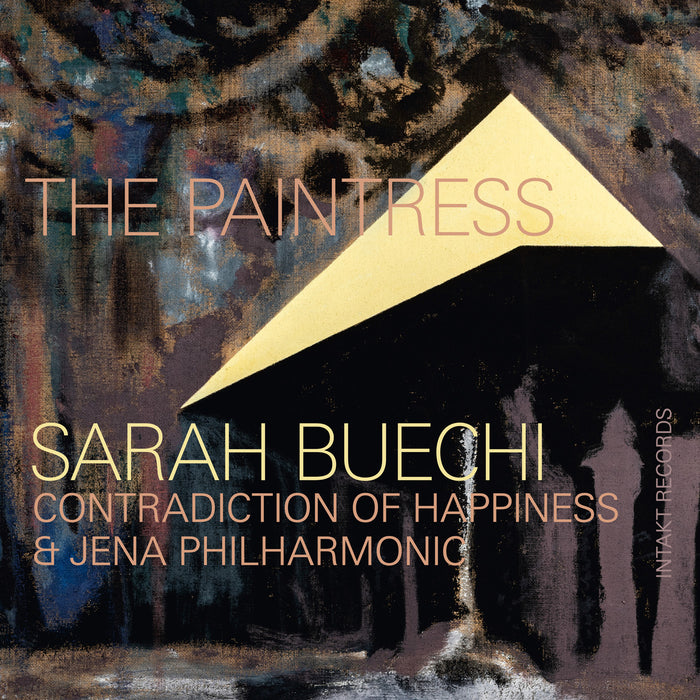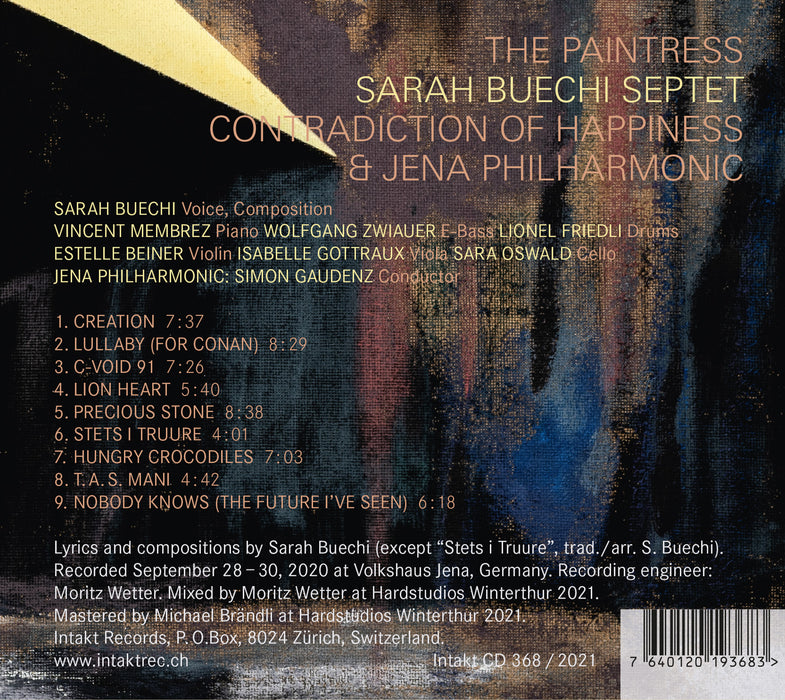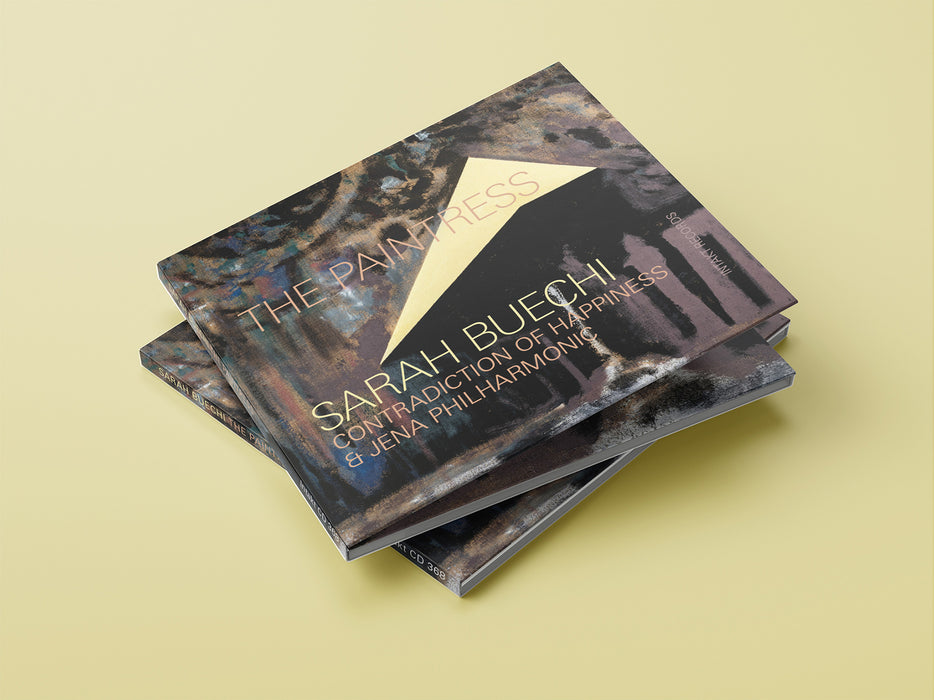


368: SARAH BUECHI. CONTRADICTION OF HAPPINESS + JENA PHILHARMONIC. The Paintress
Intakt Recording #368/ 2021
Sarah Buechi: Voice, Composition
Vincent Membrez: Piano
Wolfgang Zwiauer: E-Bass
Lionel Friedli: Drums
Estelle Beiner: Violin
Isabelle Gottraux: Viola
Sara Oswald: Cello
The Jena Philharmonic:
Simon Gaudenz: Conductor
Katharina-Viktoria Georgie, Heidrun Wenke, Johannes Tauber, Lydia Hug: Violin
Anne-Marei Holter, Oreto Vayá Chover: Viola
Alexander Wegelin: Violincello
Przemyslaw Bobrowski: Contrabass
Pia Scheibe: Flute
Jörg Schneider: Oboe
Vincent Nitsche: Clarinet
Manfred Baumgärtner: Bassoon
Robinson Wappler: Horn
Alexander Suchlich: Trumpet
Douglas Murdoch: Trombone
Bruno Osinski: Tuba
Reinhard Eichhorn: Timpani
René Münch: Percussion
Recorded September 28 – 30, 2020 at Volkshaus Jena, Germany.
More Info
Sie fliegen gemeinsam – das Kammerorchester und das Septett von Sarah Buechi. Souverän über alle Kategorien hinweg. Sarah Buechi's Septett Contradiction of Happiness mit Piano, Bass und Schlagzeug sowie drei Streicherinnen ist in sich bereits so etwas wie ein vielstimmiges und befreites Orchester. In Jena erweiterte Sarah Buechi dieses Ensemble mit einem Kammerorchester. Die Uraufführung im Jenaer Volkshaus war ein grandioser Erfolg. Das Publikum spürte, wie sich die aus unterschiedlichen Musikbereichen Kommenden gegenseitig zu inspirieren vermochten. In Jena entstanden auch die Aufnahmen für das vorliegende Album. Klassische Intonation, Jazzvokalisen, Sprechgesang, Mikrotonales wie in der indischen Musik sowie Konnakol, die Vokalisierung des Rhythmischen – all das findet sich in den Stücken. Die Übergänge zwischen ausgeschriebenen Arrangements und Improvisationen gestalten sich fliessend. "Eine Musik voller Lust an der Erkenntnis" , schreibt Bert Noglik in den Liner Notes: "am Flügelschlag des Poetischen im gemein- samen Flug mit Septett und Orchester. ”
Album Credits
Cover art: Conor Flynn O'Donnell
Graphic design: Jonas Schoder
Liner notes: Bert Noglik
Photo: Tina Peissker
Lyrics and compositions by Sarah Buechi (except "Stets i Truure", trad./arr. S. Buechi). Recorded September 28 – 30, 2020 at Volkshaus Jena, Germany. Recording engineer: Moritz Wetter. Mixed by Moritz Wetter at Hardstudios Winterthur 2021. Mastered by Michael Brändli at Hardstudios Winterthur 2021. Produced by Sarah Buechi and Intakt Records, Patrik Landolt, Anja Illmaier, Florian Keller. Published by Intakt Records.
Op zijn beurt maakte Chris Speed gebruik van de lockdown om een soloplaat op te nemen. Niets bijzonders, alleen speelt hij klarinet, een niet zo evidente keuze.
Naast eigen (geïmproviseerd) materiaal ging hij tevens aan het werk met composities van onder meer Ornette Coleman, Julius Hemphill, Eric Dolphy en zelfs Andrew D’Angelo.
Het klankenpalet varieert ten slotte van repetitieve clusters à la Philip Glass (‘Koyaanisqatsi’) tot rondtollende dervish-momenten en folk met Indonesische inslag (zoals in ‘Light Line’ waarin de klarinet bijna als een fluit klinkt). Enkele malen duiken sterke bindingen met de natuur op zonder te vervallen in new age (‘Cat Heaven’). Soms lijkt het of Speed steeds terugkeert naar hetzelfde beginpunt maar hij kiest wel telkens opnieuw voor een andere richting en wil daarbij alsmaar verder en hoger. Natuurlijk ontbreekt het klassieke tintje niet, al dan niet verscholen tussen speelse toonladders. Enkel in de afsluiter (Paul Motian’s ‘It Should Have Happened A Long Time Ago’) is er wat overdub om een drone-effect toe te voegen.
Zeker geen “musician’s musician” aanpak maar wel een ontluisterende zelfreflectie van deze topmuzikant.
https://www.jazzhalo.be/reviews/cdlpk7-reviews/various/vier-maal-solo/?fbclid=IwAR2nwN019B9dfw8muPET_Yom2PPphSi_FuVzb-kCNLBBnBwFVdLiuL94xaQ
Ein Klarinetten-Soloalbum? Ja, aber gleich vorweg: Zum Hören braucht es eventuell den Führerschein zum Advanced Music Listening. Für diejenigen, die sich Zeit für die knochentrocken aufgenommene Session Light Line des Klarinette spielenden Saxofonisten Chris Speed nehmen, entpuppt sich das Album aber als kleine Sensation. Prominent erklärt Contemporary-Clarinet-Kollege Anthony Burr in den Liner Notes die Melodie zum Primat der Musik. Das stimmt allerdings nur zur Hälfte, denn da ist ja auch noch der Rhythmus, und dessen Gesetze beherrscht der Klarinettist Speed, zu erleben in vielen der mit profunder Atemtechnik vorgetragenen minimalistischen Solostückchen. Davon zeugen der atemberaubende Fluss der Arpeg-gien in „Drifting", das 12-tönig hüpfende „Sphasos Triem" (eine Komposition des Weggefährten Andrew d'Angelo) und, auf völlig andere Weise, das volkstümlich klingende „La Rosita Arribeña". Außer eigenen Kompositionen und kurzen Improvisationen steuert Chris Speed mit „Miss Ann" eine Hommage an Eric Dolphy bei, huldigt Julius Hemphill mit dessen „Rites" und betreibt Avantgarde-Traditionspflege mit Ornettes „Enfant" sowie Coltranes „Sun Ship". Und bei all diesen Eskapaden scheint die volle Konzentration des Musikers auf sein schwieriges Soloinstrument irgendwie auf Zuhörer*innen überzuspringen.
コロナ禍の時期だからこそ生まれたクラリネット・ソロ作
テナー奏者のイメージがあるスピードが、クラリネットの練習に充てて本作を完成。フリーでトリッキーなアプローチは避けて、正攻法でテクニカルに楽器をコントロール。循環呼吸奏法で吹き切る②、最後にテーマが現れて落着するエリック・ドルフィー曲⑤、楽曲のエッセンスを2分45秒に凝縮したジュリアス・ヘンフィル曲⑥, 『オーネット・オン・テナー』からの選曲が興味深い⑫の他、コルトレーンやP. モチアン曲も収める意欲作。
"Working on this music gave me strength, purpose and joy during a most difficult year", schreibt Chris Speed zu seiner neuen CD. Entstanden während der Lockdown-Wochen, hat Speed das ganze Album als Solist auf der Klarinette eingespielt. Das ist eine Überraschung, kennen wir doch Speed vor allem als wendigen Saxophonisten in Bands von Tim Berne (Bloodcount, Endangered Blood, Broken Shadows), Jim Black (Pachora), Dave Douglas, Uri Caine oder Mary Halvorson. Die zweite Überraschung ist das Repertoire, das neben ein paar eigenen Stücken aus solchen von Eric Dolphy, Ornette Coleman, Julius Hemphill, John Coltrane, Skulli Sverrisson oder Paul Motian besteht. Alles Musiker, die ihn inspiriert haben. Dabei fokussiert er sich auf die innewohnende Melodie und Atmosphäre der Tracks, die er nachzeichnet, verwischt, reduziert, erweitert, mit zusätzlichen Timbres versieht. Alle 15 Tracks bilden eine schlüssige Linie, geprägt vom warmen und runden Klang der Klarinette und den stets strukturierten Annäherungen an die Es-senzen der Tracks und wie Speed sie emotional erfasst. Dem rasant gespielten Original "Miss Ann" von Eric Dolphy rückt er so behutsam wie umfassend zu Leib und legt gekonnt dessen melodisches Zweigwerk frei. Vielleicht ist das ein Album, wie es mit seiner Konzentration auf ein Instrument sowie dem intensiven Probeprozess mit seiner Auseinandersetzung und Vertiefung von anspruchsvollen zeitgenössischen Jazz-Stücken nur in den Lock-down-Monaten entstehen konnte. Das ist auch für uns Hörende nahrhafter, als sich mit den Zoom-und Stream-Projekten begnügen und oft das Bezwingende vermissen zu müssen.
The musicians and longtime friends discuss their Covid-era solo projects, the endless gifts of the Thelonious Monk songbook, and the challenges of building a community for improvised music in a new city.
Guitarist Jeff Parker and reedist Chris Speed first met in the late 1980s when they were both students in Boston-Parker at Berklee, and Speed at New England Conservatory. In the years since, they've each taken circuitous routes in music, parlaying their broad sensibilities and creative curiosity into many disparate projects. Parker moved to Chicago, where he joined the instrumental rock band Tortoise and began a long-time collaboration with cornetist Rob Mazurek in various incarnations of the Chicago Underground Quartet and Isotope 217. Since 1995, he's been a member of the Association for the Advancement of Creative Musicians (AACM), where he spent years playing in Ernest Dawkin's New Horizons Ensemble. His long and diverse list of collaborations also includes work alongside Fred Anderson, Joshua Redman, Brian Blade, Matana Roberts, and Nicole Mitchell, among many others. More recently, sled his own band The New Breed, where his skills as an electronic music producer are on full display. Speed settled in New York, working in collectives like Human Feel, with Kurt Rosenwinkel, Jim Black, and Andrew D'Angelo, John Hollenbeck's Claudia Quartet; the Balkan-flavored quartet quarter Pachora; and his own idiosyncratic quartet Yeah NO, which borrowed ideas from electronic music and minimalism. In 2014, he assembled an agile, history-informed trio with Dave King and Chris Tordini, and this past fall he joined The Bad Plus-where, along with guitarist Ben Monder, he's helping to remake the veteran piano trio into something new and entirely unexpected.
Both musicians are based in Los Angeles and recently released solo records made during the pandemic. They spoke over Zoom in November 2021.
Jeff Parker: I had your solo CD playing on repeat in the car for a month. I really enjoyed it, man. That's kind of a cool thing about the lockdown period-there were so many bedroom records and solo projects that people got into over this strange time... a lot of very reflective music, you know?
Chris Speed: I was inspired by your solo record that came out before the pandemic [Parker's 2016 allbum Slight Freedom). It has such great ambience, and such great moods that you made for each one of those pieces. wondering what sort of prep went into that.
JP: That record came about when I first moved to LA. I didn't know anybody. I rented a practice space. Lee Anne [Schmitt] had a friend who was in a weekend warrior rock band, and they rented this rehearsal space in Highland Park, and I gave him a hundred bucks a month. I would go and use the space in the day when they weren't in. I just went in there and I had my amp and my looping pedal-all my stuff was still in Chicago, mostly. I went there and I would practice and work on stuff during the day and I ended up coming up with a repertoire of stuff. It was hard to do, man. The music wasn't hard to do, but it hard to figure out a solo thing. Most of it came from listening to Monk and Steve Lacy and Sonny Rollins, who are all virtuosos. I just finished another solo guitar record. It's just me and my pedal board.
CS: I guess we all think about making solo records. I was just never thinking about it enough to actually get it done. But Covid, and having that time alone, definitely inspired me to actually follow through with it. I think all of us were dealing with a lot of, if not solo work, at least going through the process of working alone. We couldn't play together. A lot of us went through a sort of self-reflection. I just needed to push through and document it and, for me, it was interesting just to have the on the actual instrument. It started with me just trying to releam the clarinet and trying to find some inspiration. I thought, I guess there's certain elements of the instrument that I want to address-blind spots-or just things I want to work on, and now I have the time and the con-centration to be able to do that. I don't know how it is for you, Jeff, but sometimes I get a little unfocused if there's too many things to learn or other bands to worry about. During Covid, there was none of that. It was just like, okay, I guess I can work on this.
JP: Yeah, I get like that, too. To be honest, I've been focusing on making my own music for the last few years. I never really had the physical space to do that until I moved out here. For one, I s kind of isolated from a I community of musicians; and two, I finally had these kinds of rehearsal spaces at my disposal For me, especially with the guitar, you think solo guitar, you think Joe Pass, Ted Green-these super virtuosic, really intricate, floral arrangements. The stuff that gave me the confidence to do it was the Steve Lacy solo stuff. Sonny Rollins has done some solo pieces. And, of course, Monk. All three of those guys are super...
Davantage connu comme saxophoniste ténor, notamment au sein de son propre trio aux côtés du contrebassiste Chris Tordini et du batteur Dave King, Chris Speed officie également de temps à autre avec Tim Berne, le bassiste Skủli Sverrisson, les batteurs Ben Perowsky et Jim Black ou encore le saxophoniste Andrew D’Angelo. Ce disque le voit revenir à la clarinette. Un retour, car c’est somme toute son instrument d’origine, celui qu’il a appris dans son jeune âge. C’est lors du confinement de 2020 qu’il a concrétisé une idée qui le taraudait depuis quelque temps déjà : réaliser un disque pour clarinette solo en donnant la part belle à des compositions écrites, laissant peu de place à l’improvisation. Sur la quinzaine de pièces alignées ici, on y retrouve des miniatures qu’il a écrites mais aussi une reprise d’Eric Dolphy (« Miss Ann »), une d’Ornette Coleman, une de Julius Hemphill, et le « Sun Ship » de Coltrane, dépouillé, raccourci et réduit à sa plus simple expression. Ce qui retient l’attention, c’est la légèreté avec laquelle il déploie ses lignes mélodiques, tout en douceur, sans jamais rien précipiter. C’est sur la reprise de Paul Motian « It Should’ve Happened a Long Time Ago » clôturant le disque qu’il excelle véritablement. Une cover magnifiquement épurée. L’idée d’écouter de long en large un disque pour clarinette solo pourrait en rebuter plus d’un. Pourtant, à bien tendre l’oreille à ce « Light Line », jamais on éprouve de lassitude ou de d’agacement. Une belle découverte.
https://jazzmania.be/chris-speed-light-line/
Les trois disques suivants font entendre trois musiciens qui se livrent à l’exercice difficile du solo absolu. Pour le premier d’entre eux nous retrouvons Chris Speed qui a choisi uniquement la clarinette. Quinze pièces sont au programme : six œuvres personnelles, dont le titre éponyme, sorte d’appel oriental qui ouvre le récital. Les neuf autres sont des transpositions de morceaux signés par autant de compositeurs différents, parmi lesquels Eric Dolphy, Julius Hemphill, Ornette Coleman, John Coltrane ou Paul Motian. On est frappé dès le début par la façon dont Speed maîtrise admirablement l’instrument : notes jumelées, harmoniques, contrôle de la sonorité (magnifique !)... Une performance magistrale et un grand moment de pure musicalité.
https://www.culturejazz.fr/spip.php?article3689
Ombre infrante nelle imperfette misure della luce: quattro dischi Intakt
Notevole, invece, l’ultima uscita di casa, un solo per clarinetto per Chris Speed, che siamo abituati ad apprezzare solitamente al sax tenore, protagonista anche nei Broken Shadows di cui abbiamo parlato prima. Quindici tracce in totale, nitida solitudine: sin dai labirinti circolari della title-track si apre un sipario su un mondo intatto e celeste, abitato da pochi elementi. Come se una pioggia apocalittica avesse lavato via tutto quanto: dopo il diluvio rimane solo la primigenia bellezza di linee melodiche che creano incessanti forme di vita nell’acqua, nell’aria e nella terra fertile delle nostre orecchie (le oblique geometrie di Sphasos Triem di Andrew D’Angelo). Un suono luminoso, pieno e controllatissimo, lirico e austero, comunicativo e distante: Speed suona da una nuvola nella stanza accanto, gli occhi al cielo, perfettamente concentrato nel restituire la compatta bellezza di composizioni di Eric Dolphy (“Miss Ann”) o John Coltrane (“Sun Ship”), di un tradizionale messicano (“La Rosita Arribeña”) o della conclusiva “It Should’ve Happened A Long Time Ago”, l’unica traccia con una sovraincisione: un lievissimo drone funge da anello attorno al quale una dolente, languida melodia può disegnare la sua imprendibile orbita. Chiusa magistrale per un disco sottile e bellissimo, che lascia la sensazione di respirare un ossigeno prezioso e dimenticato.
https://www.thenewnoise.it/ombre-infrante-nelle-imperfette-misure-della-luce-quattro-dischi-intakt/
Neues von der improvisierten Musik
Mit Ende 60 veröffentlicht Kontrabassist Marc Johnson seine erste Solo-Platte und verrät, was Bill Evans und die New Yorker U-Bahn damit zu tun haben. Außerdem: Acht Jahre nach seinem Tod ist das letzte Album des Piano-Eigenbrötlers Masabumi Kikuchi erschienen – ein bewegendes Vermächtnis.
Der amerikanische Holzbläser Chris Speed hat 2021 mit „Light Line“ seine erste reine Soloarbeit vorgelegt – eines der ganz wenigen unbegleiteten Klarinettenalben im Jazz. Eine Platte im Zeichen von Risiko, Reduktion und Rückbesinnung auf seine Anfänge.
Chris Speed: „Light Line“
CD-Vorstellung von Bert Noglik
https://www.deutschlandfunk.de/aktuelle-jazz-veroeffentlichungen-neues-von-der-108.html
Uno degli ultimi avvistamenti discografici era stato quello (magnifico) con Tim Berne per Broken Shadows. Adesso arriva questo cd azzardato e riuscito, il sistema che ha escogitato Speed per sopravvivere al lockdown: trovare, per usare le sue parole, «forza, scopo e gioia in un periodo difficile, lavorando sulla musica di compositori che hanno tutta la mia gratitudine, rispetto e amore». Sono, tra gli altri, Dolphy, Hemphill, Ornette Coleman, Coltrane, Paul Motian. Tutti indagati nella vertigine labirintica e razionale del clarinetto solo.
